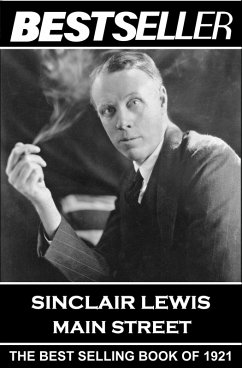Harry Sinclair Lewis was born on February 7th, 1885 in the village of Sauk Centre, Minnesota.
Throughout his lonely boyhood, the ungainly Lewis-tall, extremely thin, stricken with acne and somewhat pop-eyed-had trouble gaining friends and pined after various local girls. By 13 he had unsuccessfully ran away from home, in an attempt to become a drummer boy in the Spanish-American War.
In late 1902 Lewis left home for a year at Oberlin Academy to qualify for acceptance by Yale University. While at Oberlin, he developed a religious enthusiasm that waxed and waned for much of his remaining teenage years. He entered Yale in 1903 but did not receive his bachelor's degree until 1908, having taken time off to work at Helicon Home Colony, Upton Sinclair's cooperative-living colony in Englewood, New Jersey, and to travel to Panama. Lewis's unprepossessing looks, "fresh" country manners and seemingly self-importance made it difficult for him to win and keep friends but a number of students and professors made the effort, some of whom recognized his promise as a writer.
Lewis's earliest published creative work-romantic poetry and short sketches-appeared in the Yale Courant and the Yale Literary Magazine, of which he became an editor. After graduation Lewis moved location and jobs constantly in an effort to make ends meet whilst writing fiction for publication.
In working for newspapers and publishing houses he developed a knack for churning our short popular stories for a variety of magazines. It was a very popular choice for writers whilst engaged on the gestation of the Great American novel. He also earned money by selling plots to Jack London, including one for the latter's unfinished novel The Assassination Bureau, Ltd.
Lewis's first published book was Hike and the Aeroplane, a Tom Swift-style pot-boiler that appeared in 1912 under the pseudonym Tom Graham.
By 1914 the first of his serious works was published-Our Mr. Wrenn: The Romantic Adventures of a Gentle Man, followed the following year by The Trail of the Hawk: A Comedy of the Seriousness of Life, and in 1917, The Job. That same year also saw the publication of another pot-boiler, The Innocents: A Story for Lovers, an expanded version of a serial story that had originally appeared in Woman's Home Companion. Free Air, another refurbished serial story, was published in 1919.
In 1930, he became the first author from the United States to receive the Nobel Prize in Literature, which was awarded "for his vigorous and graphic art of description and his ability to create, with wit and humor, new types of characters."
Sinclair Lewis died in Rome on January 10th, 1951, aged 65, from advanced alcoholism. His cremated remains were buried in Sauk Centre, Minnesota.
Throughout his lonely boyhood, the ungainly Lewis-tall, extremely thin, stricken with acne and somewhat pop-eyed-had trouble gaining friends and pined after various local girls. By 13 he had unsuccessfully ran away from home, in an attempt to become a drummer boy in the Spanish-American War.
In late 1902 Lewis left home for a year at Oberlin Academy to qualify for acceptance by Yale University. While at Oberlin, he developed a religious enthusiasm that waxed and waned for much of his remaining teenage years. He entered Yale in 1903 but did not receive his bachelor's degree until 1908, having taken time off to work at Helicon Home Colony, Upton Sinclair's cooperative-living colony in Englewood, New Jersey, and to travel to Panama. Lewis's unprepossessing looks, "fresh" country manners and seemingly self-importance made it difficult for him to win and keep friends but a number of students and professors made the effort, some of whom recognized his promise as a writer.
Lewis's earliest published creative work-romantic poetry and short sketches-appeared in the Yale Courant and the Yale Literary Magazine, of which he became an editor. After graduation Lewis moved location and jobs constantly in an effort to make ends meet whilst writing fiction for publication.
In working for newspapers and publishing houses he developed a knack for churning our short popular stories for a variety of magazines. It was a very popular choice for writers whilst engaged on the gestation of the Great American novel. He also earned money by selling plots to Jack London, including one for the latter's unfinished novel The Assassination Bureau, Ltd.
Lewis's first published book was Hike and the Aeroplane, a Tom Swift-style pot-boiler that appeared in 1912 under the pseudonym Tom Graham.
By 1914 the first of his serious works was published-Our Mr. Wrenn: The Romantic Adventures of a Gentle Man, followed the following year by The Trail of the Hawk: A Comedy of the Seriousness of Life, and in 1917, The Job. That same year also saw the publication of another pot-boiler, The Innocents: A Story for Lovers, an expanded version of a serial story that had originally appeared in Woman's Home Companion. Free Air, another refurbished serial story, was published in 1919.
In 1930, he became the first author from the United States to receive the Nobel Prize in Literature, which was awarded "for his vigorous and graphic art of description and his ability to create, with wit and humor, new types of characters."
Sinclair Lewis died in Rome on January 10th, 1951, aged 65, from advanced alcoholism. His cremated remains were buried in Sauk Centre, Minnesota.
Dieser Download kann aus rechtlichen Gründen nur mit Rechnungsadresse in D ausgeliefert werden.


